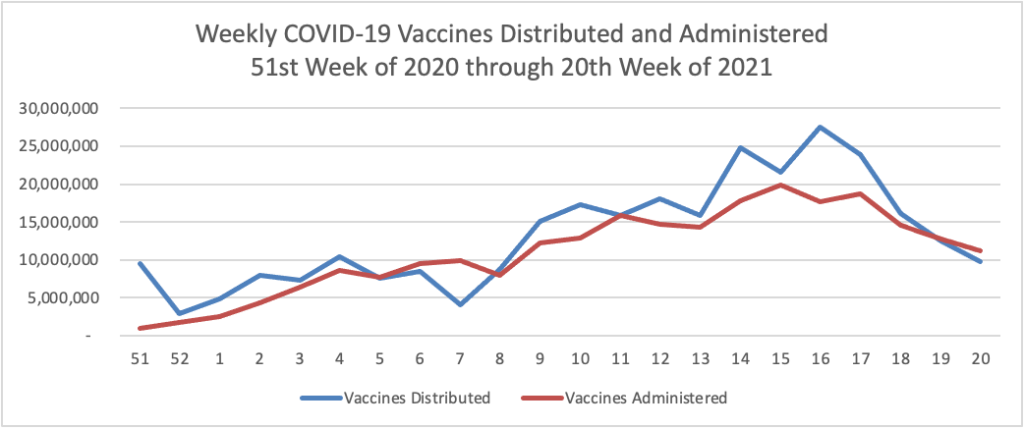Based on the Centers for Disease Control’s COVID-19 Data Tracker website, here is the FEHBlog’s chart of new weekly COVID-19 cases and deaths over the 14th week of 2020 through 20th week of this year (beginning April 2, 2020, and ending May 19, 2021; using Thursday as the first day of the week in order to facilitate this weekly update):

and here is the CDC’s latest overall weekly hospitalization rate chart for COVID-19:

The FEHBlog has noticed that the new cases and deaths chart shows a flat line for new weekly deaths because new cases greatly exceed new deaths. Accordingly here is a chart of new weekly COVID-19 deaths over the period April 2, 2020, through May 19, 2021:

Finally here is a COVID-19 vaccinations chart over the period December 17, 2020, through May 19, 2021, which also uses Thursday as the first day of the week:

With respect to COVID-19 vaccinations, Medscape reports that
The COVID-19 vaccines authorized for use in the United States and Europe offer protection against the four main coronavirus variants known to exist, a World Health Organization official says. “All COVID-19 virus variants that have emerged so far do respond to the available approved vaccines,” WHO European Regional Director Hans Kluge said Thursday at a news conference.
In sum, from the COVID-19 stats front, the Centers for Disease Control states
COVID-19 cases, hospitalizations, and deaths are going down, and the number of people vaccinated continues to go up, providing a sense of optimism as summer approaches. As of May 20, 48.4% of the U.S. population ages 18 years and older is fully vaccinated, and 60.5% have received at least one dose of a COVID-19 vaccine. Additionally, as of last week, millions more are now eligible to receive a COVID-19 vaccine. These trends and new CDC evidence-based guidance on masking provide encouragement that we are making progress toward returning to a sense of normalcy.
As you look ahead to summer, consider how COVID-19 is spreading in your community when choosing activities. Outdoor activities and visits are safer than those indoors, but fully vaccinated people can participate in most indoor activities without much risk. If you are not yet vaccinated, you should continue to practice prevention strategies such as wearing a well-fitted mask, practicing physical distancing, avoiding crowds, and washing your hands.
In the “and more” category
Health Affairs discusses five keys to realizing health equity in U.S. health plans. To wit
“The five major priorities (and the achievements that will result from these priorities) for health equity leadership in health plans are:
- Prioritizing Prevention and Wellness: Benefits and care delivery redesign
- Prioritizing Communities: Engagement and investments
- Prioritizing Innovation: Population and digital health
- Prioritizing Education, Research, and Workforce Development: Academic-community collaborations
- Prioritizing Action and Accountability: Data-driven improvement.”
mHealth Intelligence reports that “GAO tells Congress to wait on expanding telehealth coverage past the pandemic.
A new report and testimony from the Government Accountability Office says the full effect of CMS waivers on telehealth coverage during the pandemic isn’t yet known, and more study is needed. That conclusion won’t make the American Medical Association happy.
Reuters informs us that “CVS Health Corp., best known for its national chain of drugstores, said on Thursday it had started offering clinical trial services to support drug developers with tasks like patient enrollment. CVS said it had already collaborated with drug developers to help facilitate clinical trials for investigational COVID-19 vaccines and treatments, which the new business will now expand.”
Speaking of clinical investigations, Medscape reports that
The novel Galleri blood test (GRAIL, Inc.), which claims to detect up to 50 different cancers from single blood draw, is about to make its clinical debut in the United States. However, an expert cautions that this test should be considered as being under clinical investigation. Providence Health System, based in Renton, Washington, will be the first health system in the US to offer access to the Galleri test, where it will be available as a complement to recommended single-cancer screening tests.
On its website, GRAIL notes that the Galleri blood test is recommended for use in adults with an elevated risk for cancer, such as those aged 50 or older. It is intended to detect cancer signals and to predict where in the body the cancer signal is located. However, it does not detect all cancers and should be used in addition to routine cancer screening tests recommended by a healthcare provider. It is “intended to be used in addition to, and not replace, other cancer screening tests,” [GRAIL’s Leslie] Strope emphasized.
The FEHBlog strongly recommends this week’s episode of the Econtalk podcast (three strong weekly episodes in a row) in which
Podcaster and author Julia Galef talks about her book The Scout Mindset with EconTalk host Russ Roberts. Galef urges us to be more rational–to be open-minded about what we might discover about the world–rather than simply defend what we already believe, which she calls the soldier mindset. The conversation is a wide-ranging discussion of our biases and the challenges of viewing the world objectively.
